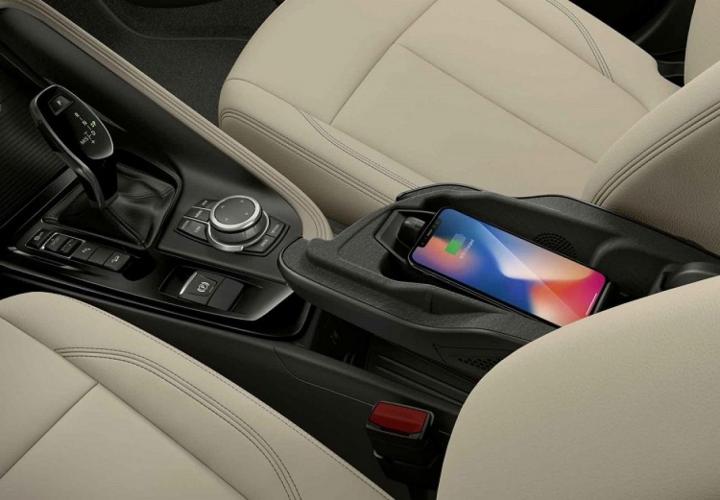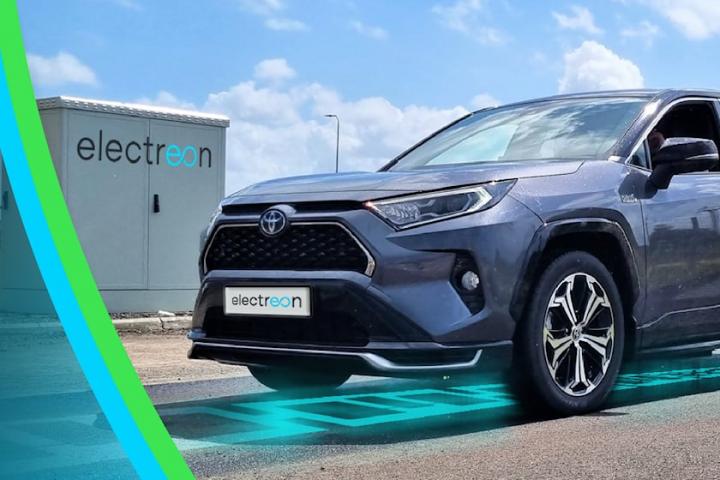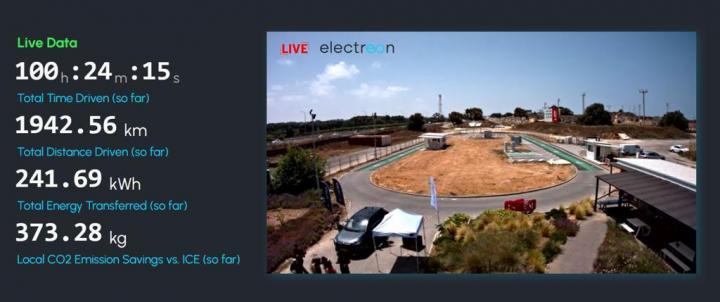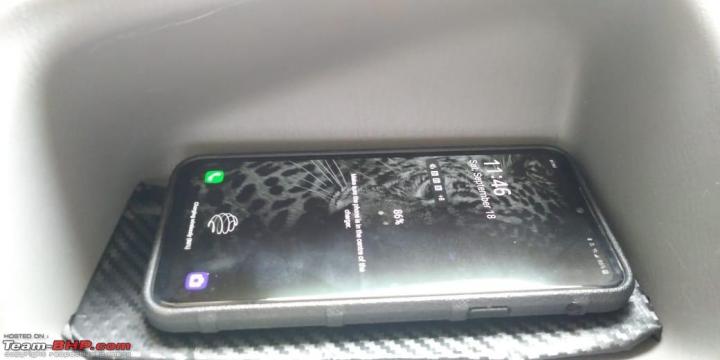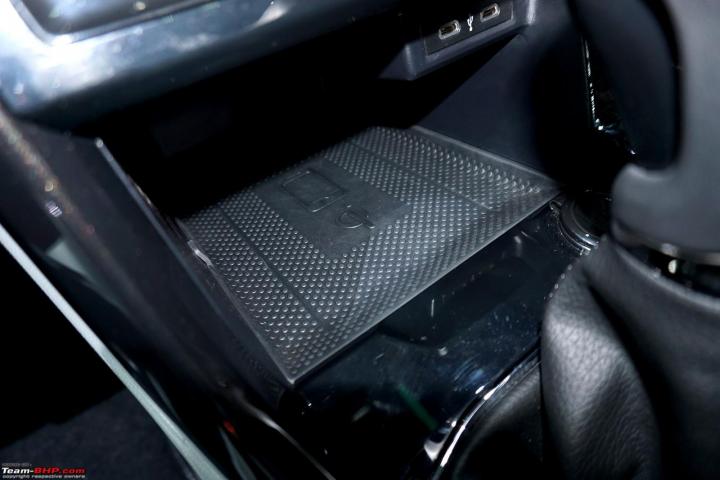News
Researchers achieve 100 kW wireless EV charging capabilities
Researchers were able to wirelessly charge a light-duty passenger EV at 100 kW with 96% efficiency.
According to reports, researchers at Oak Ridge National Laboratory (ORNL) have managed to achieve the world's highest power density for a wireless charging system for a vehicle in the light-duty passenger EV segment.
Reports state that the researchers were able to wirelessly charge a light-duty passenger EV at 100 kW with 96% efficiency. The wireless charger was developed using polyphase electromagnetic fields by scientists at ORNL - a US Department of Energy organisation. The patented system reportedly transferred power to a Hyundai Kona EV using electromagnetic fields across a five-inch air gap.
Omer Onar from ORNL, stated, "We’ve achieved the highest power density in the world for a wireless charging system for this class of vehicle." Onar further mentioned, "Our technology reaches power densities 8-10 times higher than conventional coil technology and can increase battery charge state by 50% in under 20 minutes."
The patented polyphase coils are said to be small and lightweight - with a diameter of just 14 inches. Also, the rotating magnetic fields generated are said to boost the power.
Onar stated, "This breakthrough achievement opens the door to fast and efficient wireless charging for passenger electric vehicles."
Source: Electrek
News
Japan: City implements EV wireless charging pilot program
Reports suggest that a 10-second roll over the coils adds 1 km of range to the EVs.
According to a media report, a city near Tokyo, Japan, is said to be testing wireless charging technology for electric vehicles.
As per reports, the Smart City of Kashiwa-no-ha is conducting a pilot program run by the Universities of Tokyo & Chiba, in partnership with 9 other companies. The University of Tokyo is said to have created the in-motion power supply system, with the researchers now testing for durability and its ability to provide consistent charge to EVs and PHEVs driving over it.
The wireless charging tech uses charging coils embedded in the road's surface at traffic signals. The system passes current wirelessly only after detecting a vehicle. EVs or PHEVs get a special device installed near the tyres, which allows them to receive electricity when they slow down while approaching the traffic lights.
Reports suggest that a 10-second roll over the coils adds 1 km of range to the EVs.
The pilot program is said to be conducted from October through to March by the University of Tokyo, under the direction of the Ministry of Transport.
Source: Electrek
News
BMW's in-car wireless chargers could destroy iPhone 15
Apple is said to be aware of this since the store staff are replacing such iPhones without asking questions.
Tech giant Apple recently unveiled its latest model, the iPhone 15. However, the new smartphone seems to have been plagued with problems from the start. Now, according to a media report, BMW owners are said to be facing a mysterious hardware issue when trying to charge their phones in their cars.
As per reports, BMW's wireless chargers are causing iPhone 15s to overheat, sending the smartphone into data recovery mode and ultimately frying up its NFC sensor.
Reports from BMW owners mentioned that their iPhone 15 got very hot while using the car's wireless chargers, and the smartphone no longer worked correctly after disconnecting it. One owner noticed that after waiting for the phone to cool down, they tried to restart it, only for the iPhone to be pushed into data recovery mode, forcing a full restore. Also, once the smartphone returned to a working state, the owner couldn't use Apple Pay as the NCF chip had become defective.
Apple is said to be aware of this since the store staff are replacing such iPhones without asking questions. Although, both Apple & BMW haven't commented on the issue.
The Cupertino-based tech company is said to have already shipped an update addressing the overheating issue. However, the wireless chargers in BMWs could still knock out the iPhone 15.
Source: AutoEvolution
News
Toyota RAV4 Prime covers 1,931 km in EV mode; sets new record
The RAV4 Prime saved 823 pounds of CO2 emissions compared to a regular ICE-powered vehicle.
Israeli startup Electreon, claims to have set a world record for the longest EV journey without stopping to charge.
Electreon recently drove a Toyota RAV4 Prime for 100 hours 24 minutes & 15 seconds in EV mode, covering 1,200 miles (1,931 km) without stopping to charge. This was made possible because of the wireless charging pads set up on the road.
During the drive, the wireless charging pads on the roads are said to have transferred 241.69 kWh of energy to the vehicle. The RAV4 Prime, a plug-in hybrid SUV that comes with a small 18.1 kWh battery pack and provides 68 km of all-electric range as standard, was driven an incredible distance split between 55 test drivers from the firm. Reports also suggest that the RAV4 Prime saved 823 pounds of CO2 emissions compared to a regular ICE-powered vehicle.
The driving experiment was conducted by Electreon to showcase the capabilities of wireless vehicle charging technologies. It also proved how even cars with small battery packs can travel long distances without having to stop frequently to charge.
Source: CarBuzz
News
Wireless EV charging enters testing phase in Germany
Electreon is said to receive up to $3.2 million in funding to set up the charging infrastructure, including two static charging stations at locations where the bus routinely stops during its schedule.
Wireless electric vehicle charging technology could soon become a reality. According to the Balingen project, an electric bus in the city of Balingen, Germany, could soon be wirelessly charged on the highway.
According to media reports, although the project involves a single bus, it can be quickly scaled up and rolled out to cars and across different locations around the world in the coming years.
As per the project, Israeli company Electreon and Germany's EnBW have teamed up to fit an Electric Road System (ERS) along a 1 km stretch of a German highway. The technology works such that a set of magnetic coils are installed in the roads, which transfer electricity through the air to another coil at the bottom of the electric vehicle. While static wireless charging stations have been around for a while, charging roads are said to be a bit more complicated and currently at an earlier stage of development.
Electreon is said to receive up to $3.2 million in funding to set up the charging infrastructure, including two static charging stations at locations where the bus routinely stops during its schedule.
Reports state that the introduction of wireless charging roads could help vehicles move to small batteries, further making them lighter, more efficient & less expensive.
Apart from Germany, the technology is also said to undergo testing in the USA. Michigan's Governer announced that the state would be testing wireless, in-road charging capabilities on its highways soon.
Source: CarScoops
News
Volvo starts testing wireless EV charging technology
Volvo claims the tech can add 60 miles of range in just 30 minutes.
Swedish carmaker Volvo has announced that it is testing wireless charging technology for electric vehicles. The company will be offering the technology on a bunch of XC40 Recharge models, all of which will be operated by a Taxi company for the next three years.
Cars equipped with the new technology will be able to charge wirelessly by parking over a charging pad embedded in the road surface. Once the car line's up correctly, it will automatically start charging without the need for the driver to get out of the vehicle. The wireless pads used for charging the XC40 Recharge EVs are supplied by Momentum Dynamics - a US-based wireless vehicle charging specialist.
Volvo claims charging speeds in excess of 40 kW, enough to add 60 miles (96.5 km) of range on the XC40 Recharge in just 30 minutes. The wireless charging tech equipped taxis are expected to be used for more than 12 hours a day, ramping up close to 1 lakh km in a year.
The tests are conducted in specialised areas of Gothenburg, known as Green City Zones. These areas allow companies to test out multiple new technologies in a real-world environment and evaluate them for a potential broader introduction.
News
DIY: Wireless smartphone charger in a Maruti Alto K10
I wanted to have a wireless charger in my Alto and was searching for the same but couldn't find anything promising so decided to do it myself and here is how I did it.
BHPian BikerKeeda recently shared this with other enthusiasts.
I wanted to have a wireless charger in my Alto and was searching for the same but couldn't find anything promising so decided to do it myself and here is how I did it.
Parts:
- Wireless charging coil (10 W, 5V 2Amp)
- Car charger
- USB Cable
- Wires
- Double tape
- Cutter
- Free time
Decided to install above the storage space above glove box.
Step 1: Get the wireless charging kit (800, including shipping).
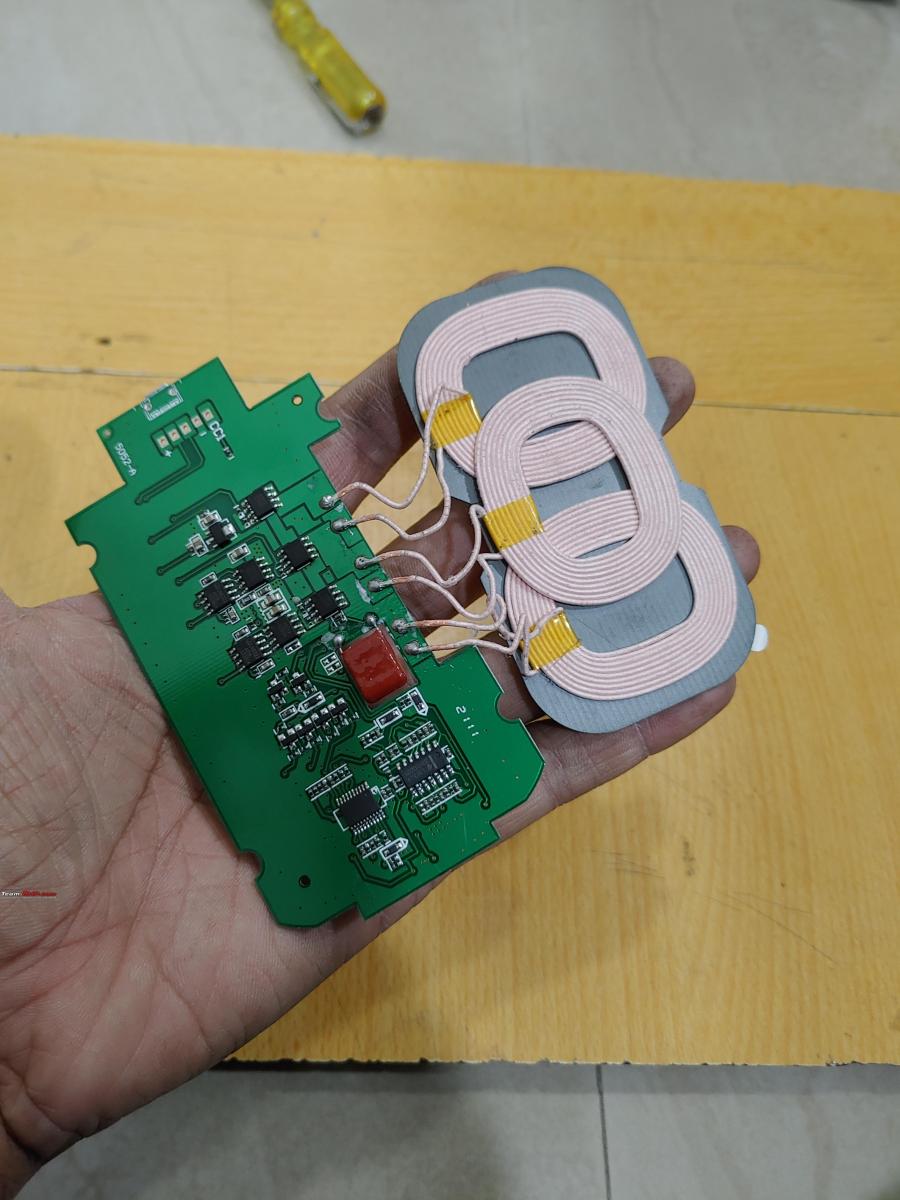
Step 2: Get a car charger and open it to remove the circuit out, attach wires to positive and negative terminals.


Step 3: Remove the Accessory tray (I don't know what is it called, lets call it Accessories Tray)
Make a cut to fit the charging kit in it. I tried fitting it below the tray directly but the charging was not working so decided to get coils in upper part and keep the circuit part hidden.
To make it flush I used cardboards and after fitting the kit I wrapped the whole thing in Carbon fibre wrap which was unused for last 3 years.





Step 4: Stick the charging circuit at a secure place and connect the usb cable.

Step 5: While routing the cable make sure you route it away from the stereo to stop it from creating interference in audio!
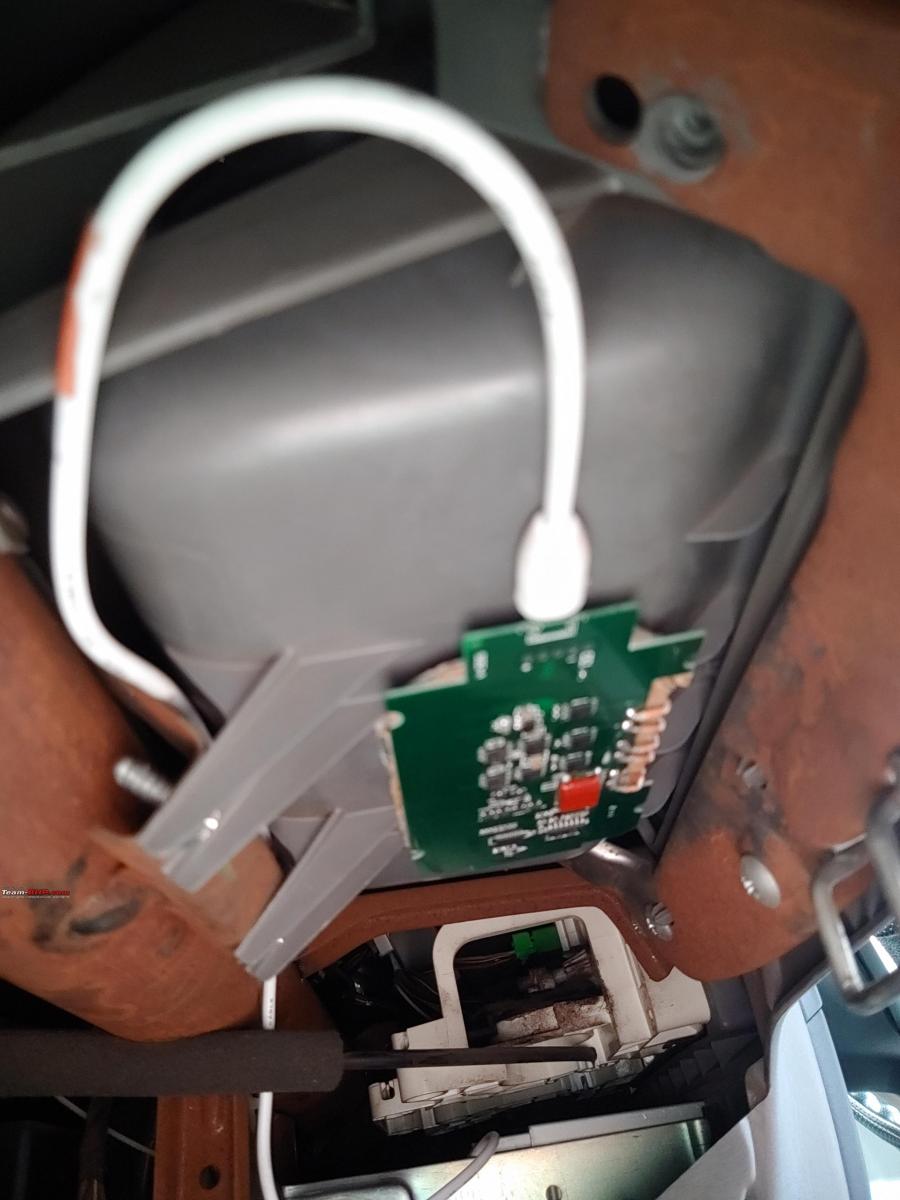
Here are the result:

Areas of improvement:
The look and finish of the upper part needs to be upgraded. Will use some old purse and cut the leather to make a good looking part which will keep the mobile from sliding while driving and stopping the charging.
Check out BHPian comments for more insights and information.
- Tags:
- Indian
- DIY
- Wireless Charging
News
USA to test wireless charging technology for EVs
The pilot program itself is said to be split into three phases, which includes a lot of testing, analysis and data crunching in the first two phases.
The Indiana Department of Transport (INDOT) has announced its plans to develop a new wireless charging system for EVs.
According to a media report, the authorities will conduct a pilot program wherein the wireless charging technology will be embedded onto the pavement, allowing EVs to either charge on the go or while being parked.
While there have been earlier reports of studies on this kind of charging infrastructure, this is the first time a US department of transport has given the go-ahead for the project.
The wireless charging project is said to be developed by INDOT and Purdue University, in association with a German company called Magment - a manufacturer of magnetic cement. The pilot program itself is said to be split into three phases, which includes a lot of testing, analysis and data crunching in the first two phases.
Phase three is when the technology will be implemented on public roads. As per the program, initially, a quarter-mile stretch will be fitted with the wireless charging system, although the exact location of the site is yet to be confirmed.
Post phase three and all the testing, the technology will have its first real rollout on a highway somewhere in the state. Having said that, reports do suggest that the exact timeline for this is yet unknown.
The state will install wireless charging pads on both the highways, as well as car parking areas. These charging pads will be installed by Magment. Also, the electric cars wanting to use this technology will have to install an under-car charging coil.
Reports also suggest that INDOT is working with Magment's panels to test them specifically for heavy trucks, at 200 kW and above fast charging.
Source: TheDrive
News
Wireless charging for electric cars under development
Wireless charging tech for EVs currently under development, will allow vehicle charging while in motion.
Researchers at Cornell University are reported to be developing a new method of charging electric vehicles. According to a media report, the researchers have come up with a wireless charging technology, which will allow owners to charge their electric vehicles while in motion.
The wireless charging infrastructure could be installed on public roads, allowing for EVs to charge on-the-go. The technology can also be used on highways by creating a separate charging lane.
EVs with low charge can enter the lane, charge their batteries and exit when done. The technology will also be able to recognise the vehicle entering the lane and send the bill to its owner.
The technology works by installing special metal plates in the road, which are connected to a powerline and a high-frequency inverter. These plates create an alternating electric field that will either attract or repel a set of similar metal plates fitted on the bottom of an EV.
This new charging infrastructure, if implemented, could potentially offer unlimited range for all kinds of EVs. It will also help EV owners save time by eliminating the need to stop and charge their vehicles, and help in curbing range anxiety. Researchers also predict that given the availability of charging in motion, EVs could also technically come fitted with smaller battery packs, thus reducing their overall weight.
Having said that, the research team at Cornell University mentioned that it would easily take 5 to 10 years for this infrastructure to be put in place. The charging infrastructure will first be introduced in major cities and busy highways in the US, before expanding to other places. This technology could also allow vehicles to get charged while waiting at traffic lights on busy city streets.
Source: Business Insider
News
In-Car wireless phone charging is seriously overhyped!
Wireless charging makes the phone hot! Wireless charging isn’t compatible with all phones & hard cases.
GTO shared this with other BHPians.
Was just reading about the VW Taigun's interior unveil and well, here is yet another car following the latest trend = wireless phone charging. IMHO, wireless charging is seriously overhyped. I drive about 30 - 40 different cars every year and prefer to carry my smartphone cable along. Reasons:
- It’s faster! Like MUCH faster. Especially with the high powered USB ports seen in some new cars.
- Wireless charging makes the phone hot! Not the case with wired charging (at least not as much).
- Wired is cheaper.
- Wired charging = Wired Android Auto, which I have found to be quicker & more responsive than wireless Android Auto.
- Wireless charging isn’t compatible with all phones & hard cases.
- Try hard cornering with the phone lying flat. In some cars, my phone flew off and ended up in the driver / passenger footwell!
- I can use the phone even while its charging.
- Precautions such as not placing the smartkey or coins on the wireless charging pad.
Any other BHPians feel the same? Am sure the technology will evolve and I will become a convert someday, but as things stand today, give me wired charging any day!
- Tags:
- Indian
- Wireless Charging
Pages





